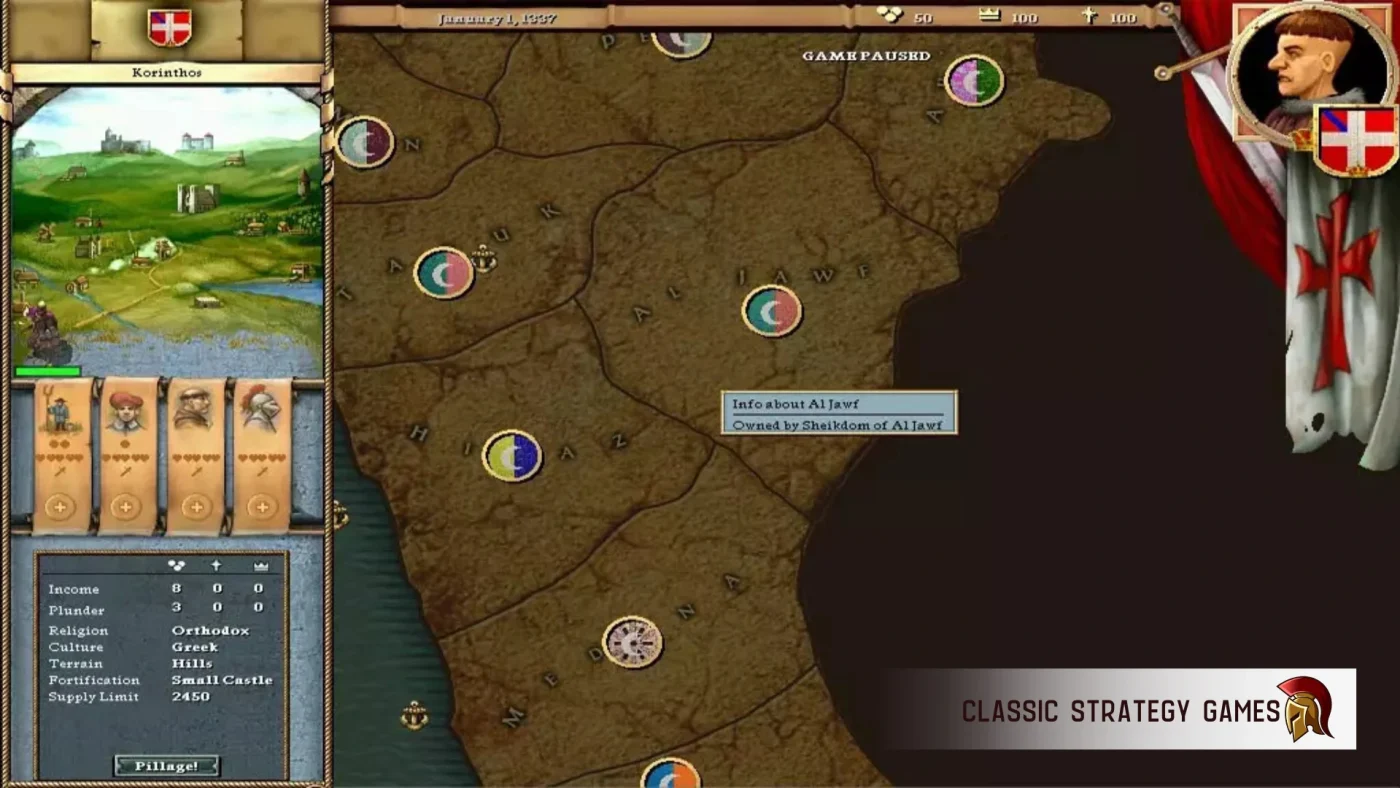In 2004, Paradox Interactive released Crusader Kings, a grand strategy game that broke new ground by shifting the focus from nations and empires to dynasties and personal relationships. Unlike traditional grand strategy games that centred on territorial conquest and resource management, Crusader Kings emphasized the intricacies of medieval politics, family dynamics, and succession. Set in the medieval period, spanning from 1066 to 1453, the game allowed players to assume the role of a feudal lord, ranging from minor counts to powerful kings, tasked with guiding their dynasty through centuries of political intrigue and warfare.
This focus on individual rulers and their families made Crusader Kings a unique and refreshing entry in the genre, laying the foundation for a series that would become one of Paradox’s most beloved and enduring franchises.
A Game of Dynasties and Succession
The core gameplay of Crusader Kings revolved around the concept of dynastic management. Players weren’t just managing a realm; they were managing a family, with the ultimate goal of securing their dynasty’s legacy. This meant balancing the demands of governance with the need to produce heirs, forge alliances, and ensure a stable succession. A ruler’s death could bring unexpected consequences, as titles and lands were divided among heirs according to feudal laws, potentially leading to internal strife and the fragmentation of power.
Succession mechanics added a layer of tension to the game, as players had to navigate the challenges of inheritance, such as dealing with ambitious relatives or discontented vassals. Marriage alliances played a pivotal role, as they could secure powerful allies or bring claims to new territories. Each marriage and birth represented an opportunity or a risk, as the traits and abilities of family members could significantly impact the realm’s stability and prosperity.
Personal Relationships and Vassal Management
One of Crusader Kings’ defining features was its intricate web of personal relationships. Every character in the game, from the ruler to the lowest courtier, had a unique personality, represented by traits that influenced their behaviour and interactions. Traits like “Just,” “Ambitious,” or “Craven” shaped how characters responded to events and how they interacted with others, creating a dynamic and unpredictable political landscape.
Players had to carefully manage their relationships with vassals, who could either support their rule or rise in rebellion. Keeping vassals loyal required a mix of diplomacy, rewards, and, occasionally, force. Players could grant titles, arrange marriages, or host feasts to improve relations, but even the most loyal vassal could become a threat if they felt slighted or if their ambitions outgrew their station. This focus on personal relationships added a human element to the game, making each playthrough feel like a unique narrative shaped by the player’s choices and the personalities of the characters involved.
Warfare and Political Intrigue
While Crusader Kings wasn’t a war-focused game, military conflict played a significant role in expanding and defending one’s realm. Wars could be declared for various reasons, such as pressing claims, defending vassals, or seizing valuable territories. However, warfare in Crusader Kings was costly and risky, requiring players to carefully consider their realm’s economic and political stability before committing to prolonged conflicts.
Beyond open warfare, players could engage in political intrigue to achieve their goals. Intrigue options included plotting assassinations, fabricating claims on enemy lands, and sowing dissent among rival factions. These tools allowed for a more subtle approach to expansion and power consolidation, providing alternatives to direct confrontation. The combination of warfare and intrigue created a rich strategic environment where brute force was only one of many paths to success.
Dynamic Events and Storytelling
One of Crusader Kings’ standout features was its dynamic event system, which brought the medieval world to life through a variety of scripted and random events. These events ranged from political crises and religious conflicts to personal dramas and unexpected opportunities. Players could be faced with decisions like how to handle a rebellious vassal, whether to support a religious reform, or how to respond to a rival’s insult.
These events not only added depth to the gameplay but also created a sense of narrative progression, as players crafted their own stories within the game’s historical framework. Every choice had consequences, shaping the realm’s future and influencing the course of the dynasty. This storytelling element made Crusader Kings feel more like a living world than a traditional strategy game, where each playthrough unfolded as a unique tale of ambition, betrayal, and legacy.
Historical Authenticity and Modding Support
Paradox Interactive’s commitment to historical authenticity was evident in Crusader Kings. The game featured a detailed map of medieval Europe, North Africa, and parts of Asia, with hundreds of playable characters and realms. The historical context provided a rich backdrop for the game’s events and mechanics, immersing players in the complexities of medieval politics and society.
Additionally, Crusader Kings embraced the modding community, providing tools and support for players to create custom scenarios, characters, and events. This modding capability extended the game’s lifespan and allowed for a wide variety of player-generated content, from historical recreations to fantastical alternate histories.
Legacy of Crusader Kings
Crusader Kings marked a turning point for Paradox Interactive, establishing a new standard for grand strategy games that focused on character-driven narratives and personal politics. Its innovative mechanics and unique approach to strategy laid the groundwork for future entries in the series, culminating in the critically acclaimed Crusader Kings II and Crusader Kings III.
The game’s blend of strategy, storytelling, and historical simulation continues to influence the genre, inspiring a new generation of games that prioritize dynamic, player-driven narratives. For fans of grand strategy and medieval history, Crusader Kings remains a landmark title that demonstrated the potential of combining large-scale strategy with the intimate, human drama of ruling a dynasty.


